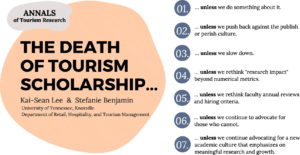CEHHS Researchers Share Faculty and Graduate Student Challenges in Commentary
Whenever we make a new acquaintance, the question, “So, what do you do for a living?” will eventually pop up. If you answer, “University professor,” it may conjure up images of a group of tweed jacketed-professors (elbow patches included) sitting by the fireplace in a wood-paneled faculty club, discussing the merits of Chaucer. However, the reality of the academic world is quite different. Pressure is increasing on faculty to have more research published and this pressure may be increasing job stress, as well as impacting the quality of research.
In the world of academia, graduate students and young professors are continually told to publish or perish. For decades, this is the charge given to those embarking on their academic careers. The more, the better. But can scholars keep up with the demands for more and more publications and still conduct quality research?
That’s the question addressed in a recent commentary by two University of Tennessee, Knoxville, College of Education, Health, and Human Sciences (CEHHS) faculty in the journal, Annals of Tourism Research. In other words, is the current culture of “publish, publish, publish” sustainable? Are scholars sacrificing quality research just for the sake of increasing the number of their publications?
“We are genuinely concerned,” said Lee. “Not just for ourselves, but for our graduate students and our discipline. Doctoral students today are asked to match up with this high-speed pursuit, and many professors today are perpetuating this reality. If we continue publishing at this pace, we may eventually fall off the wrong end of a slippery slope.”
Kai-Sean Lee is an assistant professor in CEHHS’ Department of Retail, Hospitality, and Tourism Management (RHTM) and he’s concerned that the current climate of “publish or perish” may possibly lead to the death of tourism scholarship. Unless…we do something about it.
“We direly need to slow academia down. We need to create and foster learning spaces where slowing down is not only okay or a viable option, but a necessary step in producing quality research. We need to push back against the “publish or perish” culture and advocate for a new culture centering on humanness and empathy,” said Lee.
Stefanie Benjamin, an associate professor in RHTM, notes that increasing publication outcomes may possibly come at the expense students’ mental health, growth and learning.
“Dismantling dominant ideologies is no simple task and riddled with complexities around power and privilege,” said Benjamin. “Some academics may not have the privilege to partake in such disruption, especially if one identifies as part of marginalized communities (i.e., black queer female faculty vs. white cisgendered male faculty). Hence, it is up to the tenured and those in positions of power to advocate for a new culture: one that we insist needs to emphasize on meaningful growth.”
It should be noted that Benjamin and Lee stress the importance of graduate students’ research outcomes as predictors of job readiness. However, both Benjamin and Lee argue that quality research takes time. Adding the stress of increasing a publication count, and having research published in less-than-stellar reputation of some academic journals, is not necessarily a good thing for the profession.
“We must promote a scholarship that places just as high value on research dissemination as the publication process. This means redesigning annual reviews to include sections for creative dissemination efforts including community workshop facilitation, publishing white papers and popular press articles, hosting/speaking in podcasts, and creating social media content to help share one’s ideas and research with broader audiences,” said Benjamin.
You can read the commentary here as well as watch a short video by Benjamin and Lee here.
Through its eight departments and 12 centers, the UT Knoxville College of Education, Health, and Human Sciences enhances the quality of life for all through research, outreach, and practice. Find out more at cehhs.utk.edu


